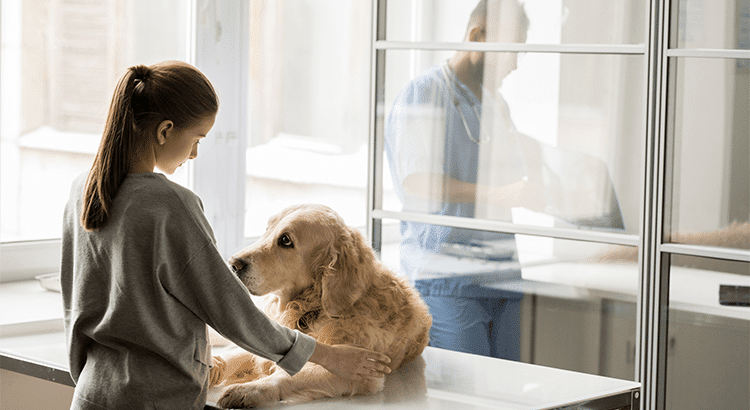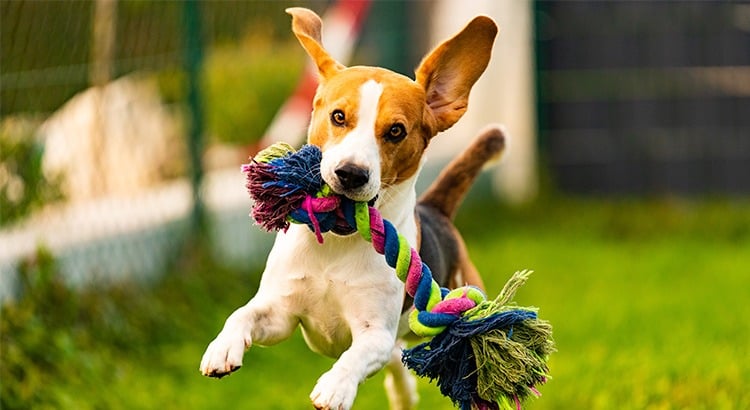
Canine infectious respiratory disease (CIRD), or kennel cough, is a highly contagious respiratory disease in dogs. It’s important to recognize when your pup may have kennel cough as it requires veterinary intervention to control the severity of the disease and preserve your pet’s health through recovery.
Symptoms According to PetMD
The first clue that your pet may have kennel cough is a gnarly, harsh cough. Secondary symptoms include sneezing, a runny nose or eye discharge.
Initial symptoms:
- A persistent dry, hacking cough
- Coughing during the night that keeps you and your dog awake
- Retching with the production of white foam
- Tracheal sensitivity” your dog coughs when you apply gentle pressure to t heir trachea
Sever symptoms include:
- Lethargy
- Loss of appetite
- Fever
- Labored breathing
Disease Timeline
The incubation period for this disease is two to fourteen days. Symptoms usually last seven to fourteen days with the contagious window lasting ten days after the last clinical symptom.
Conditions to Avoid
The following conditions contribute to a pup’s likelihood in contracting kennel cough:
- Crowded conditions
- Poorly ventilated spaces
- Experiencing cold temperatures
- Exposure to dust or cigarette smoke
- Travel induced stress that weakens the immune system
Treatment
Recovery from kennel cough takes roughly three weeks. Treatment may not be warranted, but in the event it is, the options include antibiotics and anti-inflammatory medications. Common antibiotics are Baytril, Doxycycline, and Clanamox. It is important to not try to self-medicate your pet at home with any over the counter drugs. Pet owners can use a harness when walking their pet to decrease the amount of additional coughing that may be induced by using a collar.
The best way to prevent this disease is through vaccination. The most common administration technique is a quick and painless nasal spray, however an oral solution is available as well. The vaccination works to target against Bordetella bronchiseptia +/- canine parainfluenza. While vaccines help reduce the risk of illness, it does not completely eliminate it. Other viruses can cause kennel cough like the parainfluenza virus.
Pin Paws Pet Care helps protect pets in the event of accident or illness. Should your pet contract kennel cough, reduce your out-of-pocket costs for covered expenses with our pet insurance plans. Visit today to receive your custom quote: Pin Paws
Table of content
Related articles

Canine infectious respiratory disease (CIRD), or kennel cough, is a highly contagious respiratory disease in dogs. It’s important to recognize when your pup may have kennel cough as it requires veterinary intervention to control the severity of the disease and preserve your pet’s health through recovery.
Symptoms According to PetMD
The first clue that your pet may have kennel cough is a gnarly, harsh cough. Secondary symptoms include sneezing, a runny nose or eye discharge.
Initial symptoms:
- A persistent dry, hacking cough
- Coughing during the night that keeps you and your dog awake
- Retching with the production of white foam
- Tracheal sensitivity” your dog coughs when you apply gentle pressure to t heir trachea
Sever symptoms include:
- Lethargy
- Loss of appetite
- Fever
- Labored breathing
Disease Timeline
The incubation period for this disease is two to fourteen days. Symptoms usually last seven to fourteen days with the contagious window lasting ten days after the last clinical symptom.
Conditions to Avoid
The following conditions contribute to a pup’s likelihood in contracting kennel cough:
- Crowded conditions
- Poorly ventilated spaces
- Experiencing cold temperatures
- Exposure to dust or cigarette smoke
- Travel induced stress that weakens the immune system
Treatment
Recovery from kennel cough takes roughly three weeks. Treatment may not be warranted, but in the event it is, the options include antibiotics and anti-inflammatory medications. Common antibiotics are Baytril, Doxycycline, and Clanamox. It is important to not try to self-medicate your pet at home with any over the counter drugs. Pet owners can use a harness when walking their pet to decrease the amount of additional coughing that may be induced by using a collar.
The best way to prevent this disease is through vaccination. The most common administration technique is a quick and painless nasal spray, however an oral solution is available as well. The vaccination works to target against Bordetella bronchiseptia +/- canine parainfluenza. While vaccines help reduce the risk of illness, it does not completely eliminate it. Other viruses can cause kennel cough like the parainfluenza virus.
Pin Paws Pet Care helps protect pets in the event of accident or illness. Should your pet contract kennel cough, reduce your out-of-pocket costs for covered expenses with our pet insurance plans. Visit today to receive your custom quote: Pin Paws

Canine infectious respiratory disease (CIRD), or kennel cough, is a highly contagious respiratory disease in dogs. It’s important to recognize when your pup may have kennel cough as it requires veterinary intervention to control the severity of the disease and preserve your pet’s health through recovery.
Symptoms According to PetMD
The first clue that your pet may have kennel cough is a gnarly, harsh cough. Secondary symptoms include sneezing, a runny nose or eye discharge.
Initial symptoms:
- A persistent dry, hacking cough
- Coughing during the night that keeps you and your dog awake
- Retching with the production of white foam
- Tracheal sensitivity” your dog coughs when you apply gentle pressure to t heir trachea
Sever symptoms include:
- Lethargy
- Loss of appetite
- Fever
- Labored breathing
Disease Timeline
The incubation period for this disease is two to fourteen days. Symptoms usually last seven to fourteen days with the contagious window lasting ten days after the last clinical symptom.
Conditions to Avoid
The following conditions contribute to a pup’s likelihood in contracting kennel cough:
- Crowded conditions
- Poorly ventilated spaces
- Experiencing cold temperatures
- Exposure to dust or cigarette smoke
- Travel induced stress that weakens the immune system
Treatment
Recovery from kennel cough takes roughly three weeks. Treatment may not be warranted, but in the event it is, the options include antibiotics and anti-inflammatory medications. Common antibiotics are Baytril, Doxycycline, and Clanamox. It is important to not try to self-medicate your pet at home with any over the counter drugs. Pet owners can use a harness when walking their pet to decrease the amount of additional coughing that may be induced by using a collar.
The best way to prevent this disease is through vaccination. The most common administration technique is a quick and painless nasal spray, however an oral solution is available as well. The vaccination works to target against Bordetella bronchiseptia +/- canine parainfluenza. While vaccines help reduce the risk of illness, it does not completely eliminate it. Other viruses can cause kennel cough like the parainfluenza virus.
Pin Paws Pet Care helps protect pets in the event of accident or illness. Should your pet contract kennel cough, reduce your out-of-pocket costs for covered expenses with our pet insurance plans. Visit today to receive your custom quote: Pin Paws



